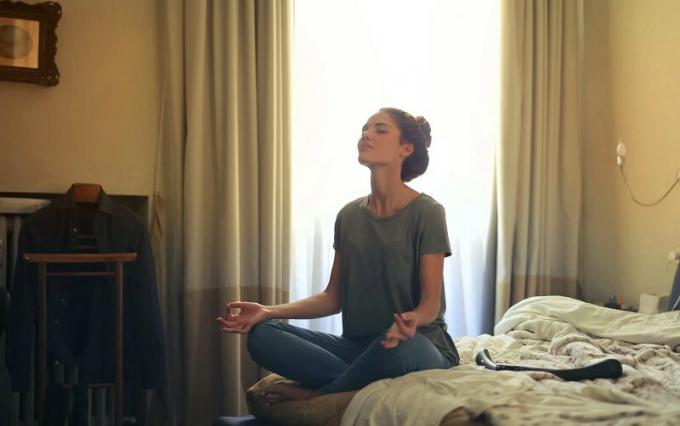7 routines and habits to overcome post-traumatic stress more easily
Post-traumatic stress is a disorder that appears after having lived through a traumatic experience, understood as an event that generates a severe emotional blow, such as exposing ourselves to real death, being in danger of death, or being a victim of violence sexual.
Given the affectation of functionality and discomfort caused by this disorder, it will be necessary to receive professional treatment, both psychological and, if necessary, psychiatric. But as a complement to psychological treatment, some habits can be established that help us to have a better and faster recovery.
In this article We will see what habits we can carry out to help overcome post-traumatic stress disorder more easily.
- Related article: "What is trauma and how does it influence our lives?"
What is PTSD?
Post-traumatic stress disorder (PTSD) is defined as a mental disorder that appears before the occurrence of a trauma, an unusual aversive event. The fifth edition of the Diagnostic Manual of the American Psychiatric Association (DSM 5) specifies that this situation is due to exposure to real death or danger of death, serious injury or sexual violence, directly, as a witness, being aware of the events that have happened to someone close or repeatedly experiencing or being exposed to aversive details of a traumatic event, such as being a health care worker ambulances.
Given the traumatic event experienced, the subject shows different symptoms that are defining criteria of PTSD, such as re-experiencing the event either during sleep, through intrusive memories or dissociative reactions in which the subject believes he is reliving the event; There is also an avoidance of both thoughts and external stimuli (places, people...) that can remind him of the trauma, and cognitions and negative affect and hyperarousal arise. Faced with memories of the traumatic event, the person is irritable, startled and has difficulty sleeping and concentrating.
Apart from the symptoms already mentioned, to be able to make the diagnosis it is necessary that they are present for more than a month and generate a deterioration or discomfort in the subject.
- You may be interested: "Types of stress and their triggers"
Habits that can help overcome post-traumatic stress
Considering post-traumatic stress disorder, psychological treatment will be necessary to get a correct resolution of the problem. In addition to professional intervention, we can and should also establish habits and routines that help us improve our situation.
Now that we know what the characteristic symptoms of PTSD are, let's see what behaviors can help us in our recovery by complementing therapy attendance.
1. practice relaxation
The training and use of relaxation techniques is common in therapy for this disorder. We can also use these techniques out of consultation during our day to day, to reduce tensions and negative thoughts or memories.
We can use breathing strategies where we use the diaphragm or the abdomen to reduce the possibility of hyperventilating. It consists of slowly taking in air through the nose while I count to three, noticing how the abdomen swells, pausing briefly and slowly release the air while I count to three, we will try to make expirations (expel) longer than the inspirations (take).

- Related article: "6 easy relaxation techniques to combat stress"
2. Maintain social contact
People are social beings and, therefore, we need contact with others to feel and be well. Likewise, even if you don't feel like seeing anyone, it is important that you maintain contact with your loved ones and with your closest environment, since they can support you during the complicated situation and the process of Recovery. It can be good for you to talk to them and express how you feel, apart from feeling shielded it will also help you organize your thoughts and be more aware of how you are or simply their presence will help you not to feel only.
- You may be interested: "How to make friends and deepen your relationships, in 7 steps"
3. Do activities that you like
In the same way that we cannot isolate ourselves socially, it is not good to stay locked up at home either, so little by little little try to do activities that you like, that distract you and help you improve both your state cognitive, not repeatedly dwelling on negative thoughts, since activation favors improving our mood.
Start with simpler activities that take less time and make you feel more confident for a short time. Gradually introduce others that are more complex or require more time, do it in a progressive.
4. Try to reduce high-stress situations
Your state of activation and affectation means that you are at risk, being able to worsen your state in the face of any external stimulus, no matter how small. So it will be advisable not to force ourselves and carry out the activities that we think we can face, avoid situations that can generate stress. As far as possible, try to control or stay distant from family or economic aspects. that alter your status or control the hours you dedicate to work and if you see yourself overwhelmed, ask to be discharged.
5. Follow a healthy routine
An external control, organization, helps to have greater control and be better internally. It is important to establish healthy habits that benefit our quick recovery, so try to eat varied and eat different times a day, set a routine for go to bed and wake up so that your body gets used to it and reduces any sleep problems you may have, play sports and try to exercise at least three times For this reason, this practice helps release endorphins that make us feel better and also favors us to clear our minds and reduce our concerns.
Similarly, eliminate unhealthy habits such as drinking alcohol frequently as a means of escape or staying in bed all day doing nothing.
- You may be interested: "How to generate new healthy habits?"
6. stay active
For psychological therapy to achieve good results, it is essential that we show ourselves to collaborate with the therapist and with the techniques and treatments that he proposes. Under the recommendation of the professional introduce the strategies that you train in therapy, such as exposure. This technique is one of the most effective in the treatment of post-traumatic stress, and it will work so that the patient can be exposed to situations and feared stimuli or even thoughts that make you uncomfortable, since avoiding certain places and interactions only makes the problem worse.
Little by little, introduce activities, places, people... that make you uncomfortable, in order to face and overcome the situation.
7. dedicate time
It is important to take care of oneself, since no one better than us will be able to know how we are or how we are. It can help you write down your thoughts, your emotions, experiences... To organize your mind. Using this technique can also make it easier for you to express yourself and bring out everything you have inside, since it will be the only way to heal it.
Likewise, as we have pointed out before, try to carry out activities that you like that help you reduce tension and disconnect, such as going for a walk or going to the pool. Relaxing activities such as yoga, meditation, or even listening to music can also help.
Are you looking for professional psychological support?
If you are interested in having services in the field of psychology, please contact us. In Psychoconsulting We serve adults and the elderly both in person and online.

